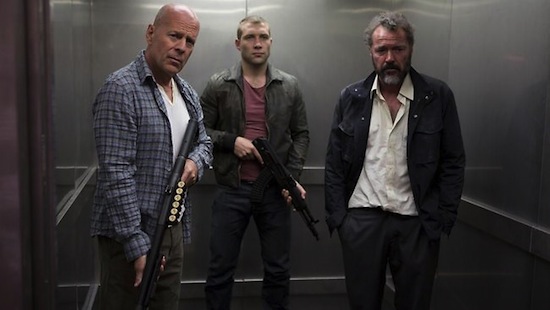When you pay for a ticket to see the latest Die Hard franchise-filler this weekend, prepare to leave physics, logic, and taste at the door. In the twenty-five years since John McClane (Bruce Willis) had his first really bad day atop the Nakatomi Plaza, lines such as ‘yippee-ki-yay’ have had plenty of time to echo through the consciousness of the action film fan, and the 1988 barnstormer redesigned the form for almost every mainstream action movie since. It’s simply a shame, then, that not even McClane himself could make a wisecrack good enough to cover up the ineptitude of A Good Day To Die Hard.
The film’s meagre plot sees McClane following his son to Moscow, eventually teaming up to rescue an insubordinate hostage and uncover some disquieting secrets from Russia’s past. Jai Courtney follows in his dad’s footsteps as Jack McClane, fitting into the franchise’s palette with ease after his brief but impressive turn in Jack Reacher, while Mary Elizabeth Winstead shows her face as Lucy from Die Hard 4.0 for about thirty seconds. Yet while Bruce Willis might physically present, it’s difficult to feel that he’s back – all the intelligent tenacity and foul-mouthed ingenuity of McClane, usually stuck crawling through an air vent or some such unfortunate circumstance, is gone. McClane 5.0 is a man with a forced smile and dead eyes, and in his 12A form, even stripped of the sweary top-end of his most famous line. To describe Willis as going through the motions here would be underselling the colossal lack of interest he conveys in delivering his shoddily-written dialogue. "I’m on vacation!" he cries on numerous cues, the script sorely pining for just a fraction of the same wit he had quarter of a century ago. The mythos of Die Hard in the 80s and 90s concerned a normal cop finding himself in the wrong place at the wrong time, trying to (admirably) get back to his family; Die Hard in the twenty-first century is about a man who inexplicably gets superpowers and fights jet planes before falling thirty stories from a building without a scratch.
Furthering that bum note, all of the applause-worthy excitement and ludicrousness of the original three films are substituted with CGI-plasticined set pieces straight from a video game. The incongruity of these aesthetic levels is even reflected in the craft itself: director John Moore has gone out of his way to shoot on an ugly, balefully hued digital format, while editing so haphazardly that we have no idea who’s pursuing who during an otherwise merely pedestrian car chase and dutifully making certain that a handful of reverse shots lack even the most basic continuity. But it doesn’t stop there as Moore seeks to insult both history and science in the latter half of the movie. In isolation these could be taken as harmless digs, but here these insults are presented with the type of cynicism that ties in perfectly with the laziness inherent in the filmmaking on every other level. It takes nothing from the series, and similarly adds nothing.
As such, the saddest aspect of its woeful 100 minutes is the fact that at no point does it ever feel like a Die Hard movie. instead, it trundles along in the same way any other sub-standard action flick, relying on explosions over character building, smart plotting and well-crafted action sequences. An explosion in the original Die Hard, on the other hand, was the satisfying punctuation of a heroic deed, the capping of an intense struggle. The natural cause-and-effect of action serving character and story is routinely ignored in favour of moments that increasingly lack meaning, as the wrongheaded endeavour crashes noisily onward. It even lacks a good villain, something which any Alan Rickman fan could tell you is downright shameful.
All this comparison to the original films may appear unfair – perhaps it’s time to move on. But now it feels, in 2013 and after five movies, that the entire franchise can be summed up as the Nakatomi Plaza from the first film: it’s being held hostage. The Hans Gruber-esque studio exec wants to continue breaking into it and wringing cash from the poor thing, and we as an audience are the unfortunate employees at the party, gathered together like cooped chickens, waiting expectantly for someone to come to our aid. Could that be John McClane? Nope, he’s too busy collecting a paycheck.


